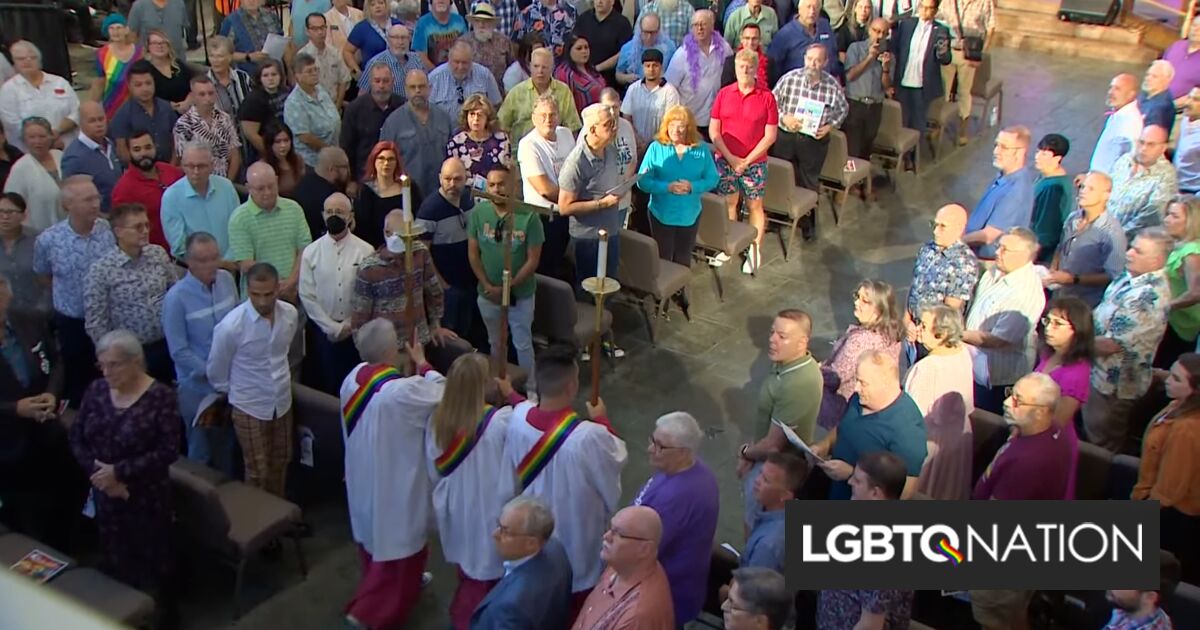- cross-posted to:
- [email protected]
- cross-posted to:
- [email protected]
The Cathedral of Hope — an LGBTQ±affirming United Church of Christ in Dallas, Texas — has made a concerted effort to defend the queer community from “persecution,” as the state government targets drag queens and transgender people.
The church recently held a service where they blessed drag queens and pledged to “stand for justice, proclaim love, and protect the rights of all people.”
While about three dozen protestors stood outside of the church hurling slurs and threats, approximately 850 people attended the service.
“Anyone check the weather today?!” one protester screamed. “’Cause it might rain fire and brimstone on this church and burn every homo inside!”
But for the ugliness on display outside, the congregation filled the building with love and “radical inclusivity.”
“We recognize that all people are made in the loving image of God, no matter who they are, how they dress, express themselves, or who they love,” the pastor intoned during the service. “We celebrate this divine diversity and commit to lifting up the voices of the LGBTQ+ community and creating spaces where everyone can thrive.”
As one worship leader noted as the pastor gave communion, “Drag queens are often targets of hate and violence.” The Sisters of Perpetual Indulgence, in particular, were singled out for particular honor due to their lifesaving work during the AIDS epidemic.
“These Sisters were at the bedsides of men dying of AIDS,” Rev. Dr. Neil G. Thomas said. “They bring humor, they bring activism, they provide and bring a level of spirituality that many of us have had taken away from us. Despite the humor, they take their spiritual work very seriously.”
The service was a response to recently passed legislation meant to make a drag a crime. The law, passed by Republicans, has been challenged in court by civil rights groups and blocked repeatedly by federal courts.
The law punishes drag performers and venues with a $10,000 fine if they allow a minor to see a “sexually explicit” performance. Such a performance is defined as one in which “a male performer [is] exhibiting as a female, or a female performer exhibiting as a male, who uses clothing, makeup, or other similar physical markers and who sings, lip syncs, dances, or otherwise performs before an audience.”
Lawyers from the Texas Attorney General’s office argued that because the law didn’t specifically mention drag, it wasn’t discriminatory to drag performances. However, in June, Gov. Greg Abbott ® shared a story about the law’s passage that contained the headline, “Texas Governor Signs Law Banning Drag Performances in Public,” and added the comment, “That’s right.” Many state politicians who supported the law also publicly stated that it was meant to target drag, specifically.
But would the law apply to churches? That’s unclear.
“My kid was here,” the lead pastor said. “I don’t have the right to choose to bring my kid to church when there are drag queens?”



I don’t know. He didn’t just “flip tables”. In John 2:15, he “braided a whip out of cords” to drive them from the temple. However, in the original Greek, the word used for whip was “phragellion”, which isn’t an ordinary whip. This was the type of whip used in Gladiatorial combat by Romans, and was typically fashioned with weights or barbs at the ends of the falls. This was a whip designed explicitly to do harm, and no other whip in the Bible is described as a phragellion. Making such a whip is a deliberate, premeditated and time-consuming process. I would argue that this specific detail suggests that, while His actions are not directed by hatred, He still clearly intended to hurt the people defiling the temple and abusing their authority.
And these are the only people Jesus ever deliberately harms. Which is very telling.
You seem very confident in a lot of what is written in a very old translation of a hodpdge of work.
You are drawing a conclusion I do not from the same text.
It seems odd to me that a divinely inspired work could be so confusing or open to interpretation.
And given so very many passages where Jesus calls for love, why do you spend so much time justifying your interpretation that says Jesus hated a particular group?
There may be food for thought here for both of us.
I didn’t say He hated anyone. In fact, I explicitly said His actions were not motivated by hatred. Jesus speaks of Justice on numerous occasions. His actions in the Temple were not hateful or vengeful, they were enacting justice upon those who abused their power, and specifically power they claimed to derive from God.